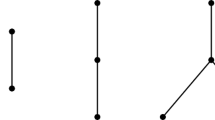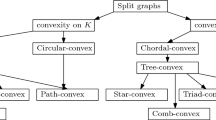Abstract
The identifying code problem is a newly emerging search problem, challenging both from a theoretical and a computational point of view, even for special graphs like bipartite graphs and split graphs. Hence, a typical line of attack for this problem is to determine minimum identifying codes of special graphs or to provide bounds for their size.
In this work we study the associated polyhedra for some families of split graphs: headless spiders and complete suns. We provide the according linear relaxations, discuss their combinatorial structure, and demonstrate how the associated polyhedra can be entirely described or polyhedral arguments can be applied to find minimum identifying codes for special split graphs. We discuss further lines of research in order to apply similar techniques to obtain strong lower bounds stemming from linear relaxations of the identifying code polyhedron, enhanced by suitable cutting planes to be used in a B&C framework.
This work was supported by an ECOS-MINCyT cooperation France-Argentina, A12E01.
Access this chapter
Tax calculation will be finalised at checkout
Purchases are for personal use only
Similar content being viewed by others
References
Argiroffo, G., Bianchi, S.: On the set covering polyhedron of circulant matrices. Discrete Optim. 6(2), 162–173 (2009)
Argiroffo, G., Bianchi, S., Wagler, A.: Polyhedra associated to identifying codes (extended abstract), In: Proceedings of the VII Latin-American Algorithms, Graphs and Optimization Symposium (LAGOS 2013), Electronic Notes in Discrete Mathematics, vol. 44, pp. 175–180 (2013)
Argiroffo, G., Bianchi, S., Wagler, A.: Polyhedra associated with identifying codes, submitted to Discrete Applied Mathematics
Argiroffo, G., Carr, M.: On the set covering polyhedron of \(q\)-roses. In: Proceedings of the VI ALIO/EURO Workshop on Applied Combinatorial Optimization 2008, Buenos Aires, Argentina (2008)
Brandstdt, A., Le, V.B., Spinrad, J.: Graph Classes: A Survey. SIAM Monographs on Discrete Mathematics and Applications. SIAM, Philadelphia (1999)
Charon, I., Hudry, O., Lobstein, A.: Minimizing the size of an identifying or locating-dominating code in a graph is NP-hard. Theoret. Comput. Sci. 290, 2109–2120 (2003)
Cornuéjols, G.: Combinatorial optimization: packing and covering. SIAM, CBMS, vol. 74 (2001)
Foucaud, F.: The complexity of the identifying code problem in restricted graph classes. In: Lecroq, T., Mouchard, L. (eds.) IWOCA 2013. LNCS, vol. 8288, pp. 150–163. Springer, Heidelberg (2013)
Földes, S., Hammer, P.: Split graphs, In: Proceedings of the VIII Southeastern Conference on Combinatorics, Graph Theory and Computing (Baton Rouge, La.), Congressus Numerantium XIX, Winnipeg: Utilitas Math., pp. 311–315 (1977)
Fulkerson, D.: Blocking polyhedra. In: Haris, B. (ed.) Graph Theory and its Applications, pp. 93–112. Academic Press, New York (1970)
Jamison, B., Olariu, S.: Recognizing \(P_4\)-tidy graphs in linear time. SIAM J. Comput. 21, 381–406 (1992)
Karpovsky, M.G., Chakrabarty, K., Levitin, L.B.: On a new class of codes for identifying vertices in graphs. IEEE Trans. Inf. Theory 44, 599–611 (1998)
Lehman, A.: On the width-length inequality. Math. Program. 17, 403–417 (1979)
Sassano, A.: On the facial structure of the set covering polytope. Math. Program. 44, 181–202 (1989)
Author information
Authors and Affiliations
Corresponding author
Editor information
Editors and Affiliations
Rights and permissions
Copyright information
© 2014 Springer International Publishing Switzerland
About this paper
Cite this paper
Argiroffo, G., Bianchi, S., Wagler, A. (2014). Study of Identifying Code Polyhedra for Some Families of Split Graphs. In: Fouilhoux, P., Gouveia, L., Mahjoub, A., Paschos, V. (eds) Combinatorial Optimization. ISCO 2014. Lecture Notes in Computer Science(), vol 8596. Springer, Cham. https://doi.org/10.1007/978-3-319-09174-7_2
Download citation
DOI: https://doi.org/10.1007/978-3-319-09174-7_2
Published:
Publisher Name: Springer, Cham
Print ISBN: 978-3-319-09173-0
Online ISBN: 978-3-319-09174-7
eBook Packages: Computer ScienceComputer Science (R0)




